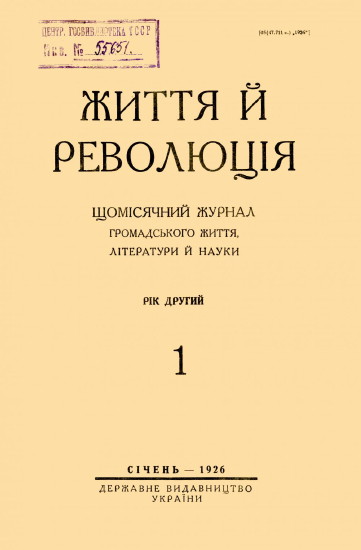Zhyttia i revoliutsiia
Zhyttia i revoliutsiia («Життя і Революція»; Life and Revolution, or ZhR). A monthly journal of politics, culture, scholarship, and civic affairs for the educated reader, published in Kyiv from January 1925 to 1933. It was edited by writers such as Mykola Bazhan, Oleksander Doroshkevych, Ivan Lakyza, Ivan Le, Yurii Savchenko, Mykola Tereshchenko, and others. With its sixth issue it began publishing belles lettres, literary criticism, poetry translations, and reviews. Like its Kharkiv counterpart Chervonyi shliakh, ZhR was a national forum for various writers, including those already established before the Soviet period (eg, Mykola Vorony, Stepan Vasylchenko) and the new postrevolutionary writers belonging to writers' groups such as MARS, the Neoclassicists, and the overtly communist Zakhidnia Ukraina and All-Ukrainian Association of Proletarian Writers.
ZhR devoted much attention to the history of Ukrainian literature, art, theater, and music and to language and literary theory and debates. It published contributions by scholars and critics such as P. Balytsky (bibliology), Oleksander Doroshkevych, Mykhailo Drai-Khmara, Pavlo Fylypovych, M. Hladky (literary language), Yevhen Kyryliuk, Ivan Lakyza, Aleksandr Leites, Hryhorii Maifet, Yurii Mezhenko (bibliography), Mykhailo Mohyliansky, Yukhym Mykhailiv (art), Andrii Muzychka, Borys Navrotsky, Leonyd Pidhainy, Valeriian Pidmohylny, Volodymyr Pokalchuk, Dmytro Rudyk, Petro Rulin (theater), Serhii Rodzevych (surveys of European literature and its translation into Ukrainian), Stepan Savchenko (foreign literature), Yakiv Savchenko, Samiilo Shchupak, Yevhen Shabliovsky, Yurii Smolych (theater), Ivan Vrona (art), Feliks Yakubovsky, Borys Yakubsky, Tetiana Yakymovych (foreign literature), Ya. Yurmas (music), Dmytro Zahul, and Mykola Zerov.
ZhR played a prominent role in promoting the development of new Ukrainian literature in the 1920s. Because the editors pursued a course that often diverged from the interests of the Communist Party, during the Stalinist campaign against Ukrainian culture that began in the late 1920s, they were increasingly forced to admit their ‘errors’ and to renounce their ways. Party control over the journal grew; it became the organ of the Federation of Soviet Writers of Ukraine in 1932 and the Organizing Committee of the All-Ukrainian Union of Soviet Writers in 1933 (see Writers' Union of Ukraine). With the full-fledged onslaught of the terror in Ukraine, the journal was shut down, and most of its contributors were repressed. N. Reva's systematic (but censored) index to its contents was published in Lviv in 1970.
Ivan Koshelivets
[This article originally appeared in the Encyclopedia of Ukraine, vol. 5 (1993).]

